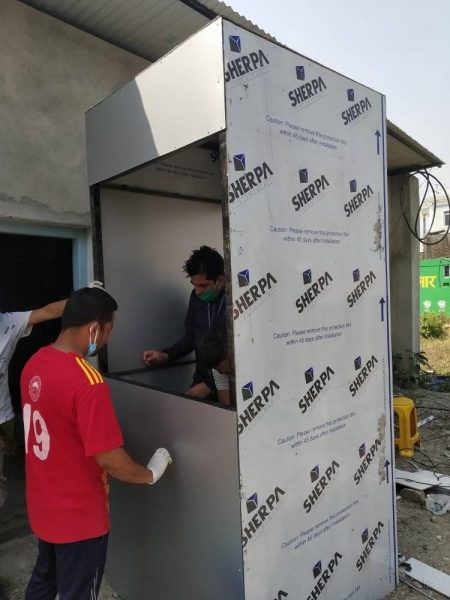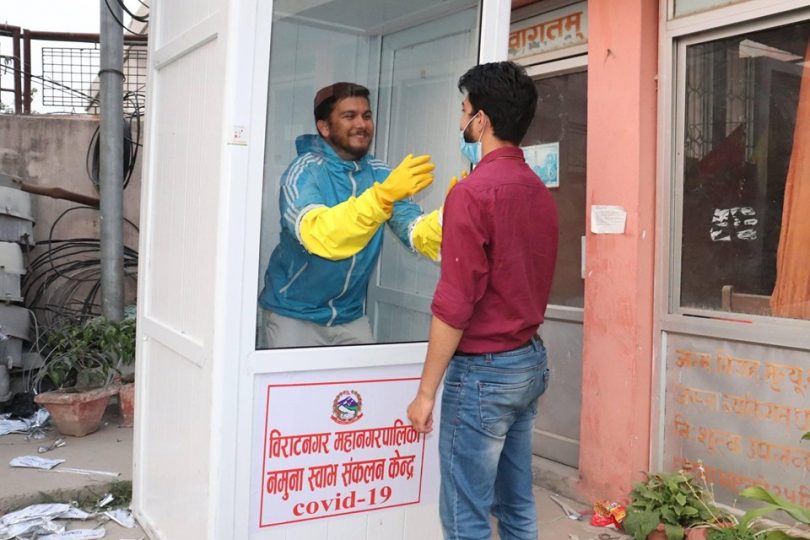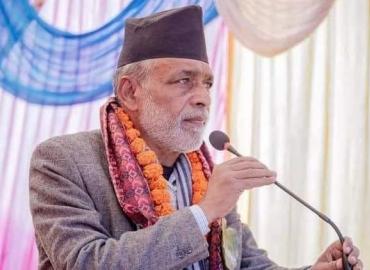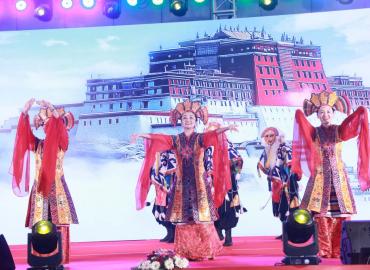Since the federal government announced lockdown to prevent possible spread of COVID-19 with effect from March 24, frontline health professionals of Itahari were scared of transmission of contagion to themselves and their family members. Lack of Personal Protective Equipment (PPEs) was the reason for their concern at the early hours of the lockdown announcement.
“We did not have any admitted suspected cases. Before the arrival of adequate PPEs, we were in trouble about testing,” said Ram Kumar Dhamala, the chief of Itahari Hospital. He added, ”The COVID-19 test booth donated by local engineers helped us feel calm mentally.”
Raju Acharya, an engineer and one of the five members to make COVID-19 test booth, said they came up with the plan after being influenced from South Korea. ”In Korea, we saw lots of COVID-19 test booths instead of disposable PPEs,” said Acharya, ”We discussed the concept with Engineers Association of Itahari and finally accomplished the first unit in April 6.”
Local engineers of Itahari have donated their first test booth to Itahari hospital in presence of deputy mayor of Itahari Laxmi Gautam. Gautam praised the innovative engineers and thanked for their support in trying times of the town.
Besides Itahari, Biratnagar, the state capital of state one, researchers have also made COVID-19 test booth on April 8 and officially handed over to the metropolis on the following day. Local technical researcher led by Prakash Subedi has made this swab collection centre (swab booth). Biratnagar Metropolitan City Office had funded the project.
Mayor Bhim Parajuli said metropolis was more than happy to collaborate with local researchers. Mayor Parajuli said his local government would hand over the booth to Biratnagar-based Koshi Zonal Hospital soon.
COVID-19 booth: a fusion of engineering and microbiology expertise
Engineers used mild steel frame with length, breadth and height of 1.05m,1.05m and 2.45m respectively. They used aluminium composite panel for wrapping up the frame and top. They used these materials for their lightweight, rustproof character and easiness of sanitization. In order to maintain positive gauze pressure in the booth, they used an exhaust fan that sucks the fresh air from the atmosphere and blows into the booth.

Similarly, they sealed the chamber and tight the air using silicon. Front of the booth is consisted of 8mm thick glass panel which is tightly sealed with two five-inch diameter holes. A PVC socket is fitted into the hole so that gloves can be attached to it properly. Plastic zippers are used to tighten every glove. UV light is installed. In order to keep the exhaust fan attached to the booth at a distance of 3m, engineers have used a flexible duct.
This was not only enough to make a booth. Engineers consulted with experts from microbiology and medical sciences. After their approval, they handed over the booth to Itahari and Biratnagar.
Engineers of the first ever COVID-19 testing and swab collection booth said the project was a result of both engineering and microbiology experts. ”We could make booth as seen from some sample products available online. However, we could not be sure of our medical or biological perfections. For this, we consulted with notes doctors and microbiologists of state one”, informed engineer Acharya.
Helpful and budget-friendly for remote areas
Engineers say their booths are mostly useful to health facilities of the remote areas of Nepal. ”PPEs are not available every time to all health facilities in our remote parts of the country”, said Mohan Karki, the leader of the booth-making engineers of Itahari. ”Booths are not disposable like PPEs. Therefore, we recommend this to all primary and district level health facilities from remote parts of Nepal.”
According to engineers, they can prepare a booth within the budgetary brackets of Rs. 45,000 to Rs. 50,000. ”The costs goes down if we are given sufficient materials like flexible ducts, UV lights and other rarely available raw materials for making booths”, said Karki. He added, ”If everything is made available, we can make final products within Rs. 40,000.”
Engineer Karki said the cost of disposable PPEs is far higher than their booth just for sample collection and testing. ”PPEs have own use in isolation and emergency. However, PPEs are not required for sample collection and testing if we do have protective booth. Even doctors and health professional are convinced on it.” Dr. Ashok Air, a doctor of Dharan-based B.P. Koirala Institute of Health Science said such booths are useful during mass transmission of the global pandemic.
Sarbadhwaj Sanba, a state assembly member of state one, has praised engineers of Itahari and Biratnagar for their innovative idea. ” Our engineers have given us a sort of hope in time of PPEs shortage in the market. All local governments and even private hospitals can collaborate with them”, remarked Sanba, also the former mayor of Itahari. RSS






















